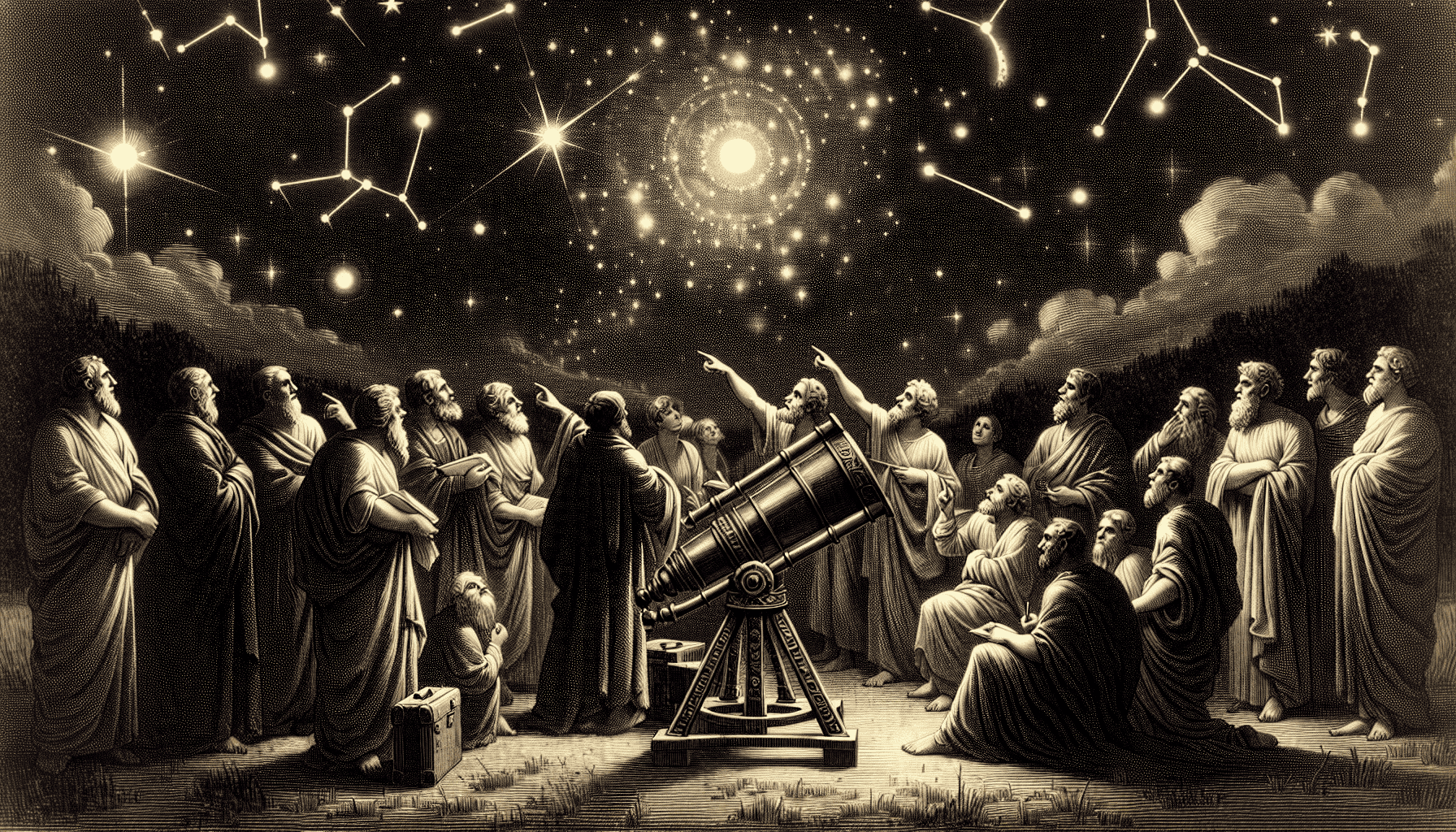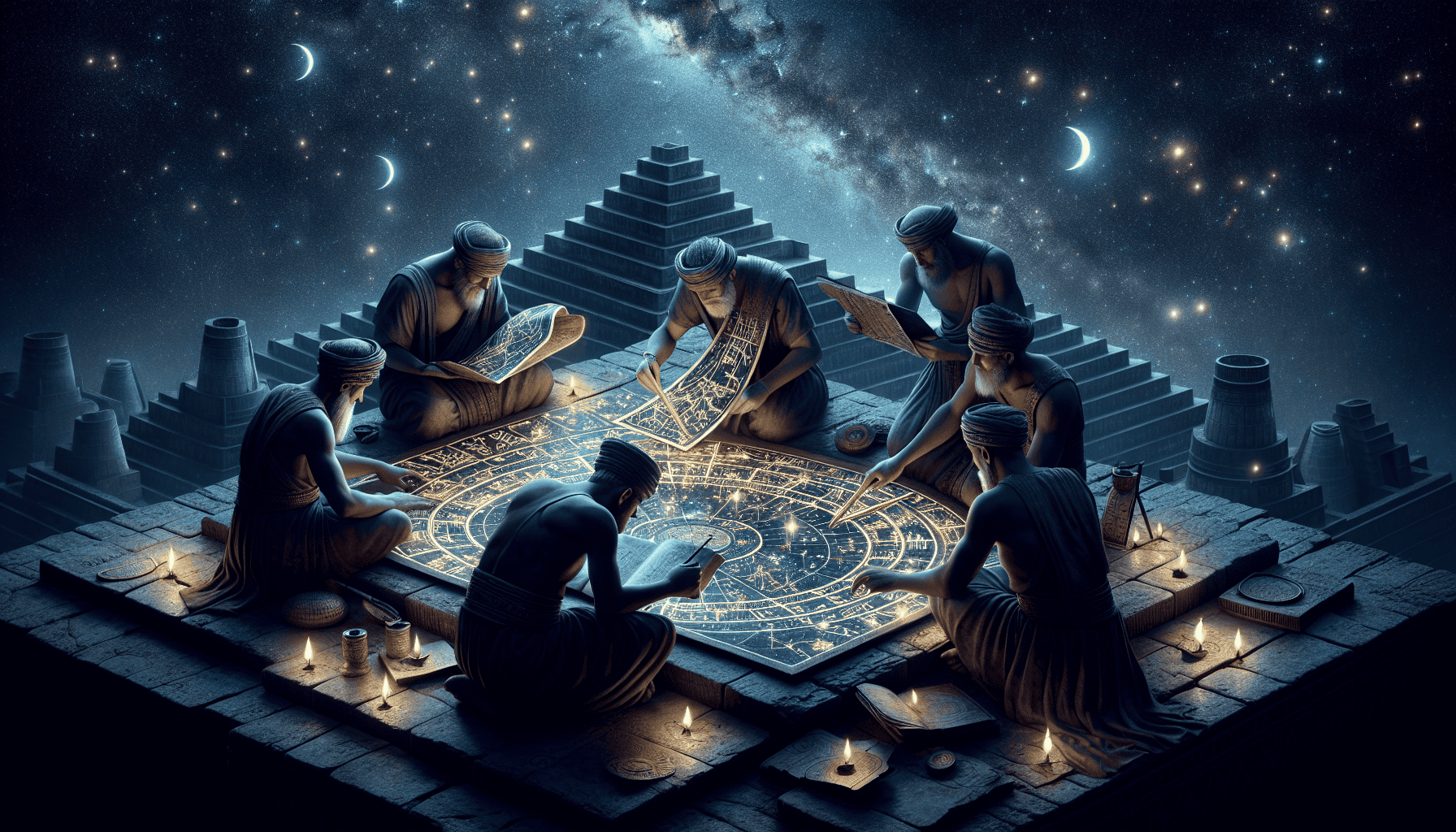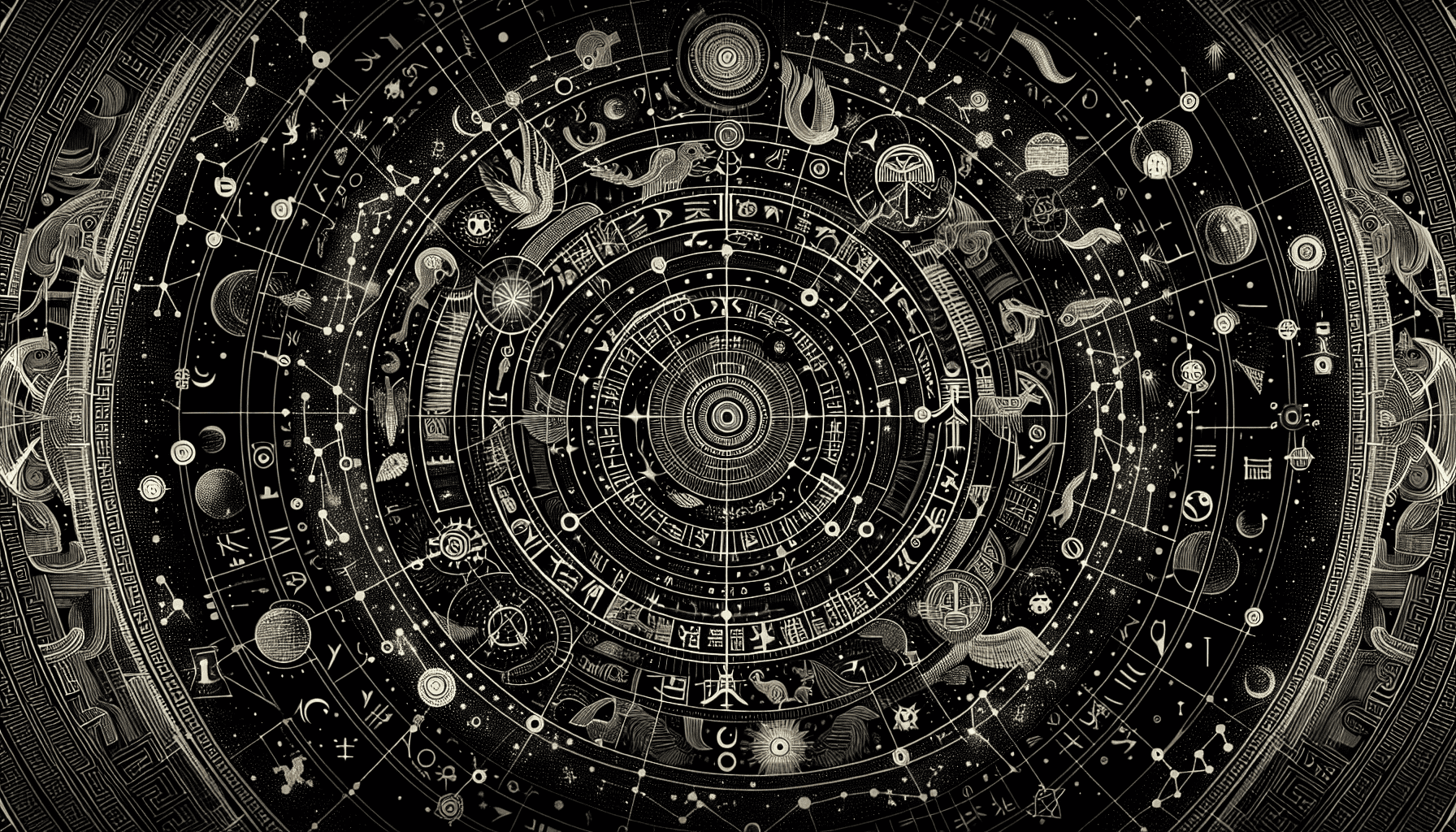- Key Takeaways
- Early Beginnings of Astrology in Ancient Cultures
- Babylonian Astrology
- Hellenistic Astrology and Celestial Bodies
- Roman Influence on Astrology
- Medieval Islamic Contributions
- Renaissance Revival
- Enlightenment Challenges
- Modern Astrology and Zodiac Signs
- Summary
- Frequently Asked Questions
Astrology has a rich history that dates back to ancient civilizations. From early lunar cycle markings on bones and cave walls to structured systems in Mesopotamia, astrology’s origin is deeply intertwined with human attempts to understand the cosmos and its influence on earthly events. This article will explore the early beginnings of astrology origin, highlighting key developments from ancient societies such as Mesopotamia, Egypt, and Greece, and the historical significance and modern practice of using zodiac signs to make predictions about a person’s life and future.
Key Takeaways
Astrology’s origins can be traced back to early human civilizations, where celestial observations were critical for agricultural and seasonal guidance, with significant contributions from Mesopotamian and Egyptian cultures.
Babylonian astrology marked the first organized system, focusing on celestial omens and horoscopic charts to guide state affairs, significantly influencing subsequent Hellenistic, Roman, and medieval Islamic astrological traditions.
The Renaissance period revitalized astrology, intertwining it with political and cultural practices, while the Enlightenment era’s focus on empirical science led to skepticism, though astrology maintained popular appeal through media and daily horoscopes into the modern era.
Chinese astrology has influenced the world’s cultural history, relating closely with Chinese philosophy through concepts such as yin and yang, the Five phases, the 10 Celestial stems, and the 12 Earthly Branches. It was also used early on in political astrology, observing unusual phenomena, identifying portents, and selecting auspicious days for events and decisions.
Early Beginnings of Astrology in Ancient Cultures

The origins of astrology can be traced back to the dawn of human civilization, where early evidence indicates a profound connection between humans and the cosmos. As early as 25,000 years ago, markings on bones and cave walls documented lunar cycles, showcasing humanity’s first attempts to measure time and predict seasonal changes based on astronomical cycles. These early observations were not mere curiosities but critical for survival, guiding agricultural activities and seasonal preparations.
The origins of the 12 signs of the zodiac can be found in ancient cultures, where they were incorporated into various belief systems. These signs were used by astrologers to make predictions about a person’s life and future.
In Mesopotamia, around the 3rd millennium BC, astrological beliefs began to take a more structured form. The ancient Sumerians developed calendrical systems that interpreted celestial cycles as divine communications. For instance, a text from the reign of the Sumerian ruler Gudea of Lagash describes how gods revealed favorable constellations for temple construction in a dream. This intertwining of celestial phenomena with divine messages laid the groundwork for astrology’s role in guiding human actions and decisions.
Ancient Egypt also played a significant role in the early development of astrology in the ancient world. The heliacal rising of Sirius, the Dog Star, was a crucial marker for the annual flooding of the Nile, forming an early astronomical calendar used by farmers. By the time of the Neolithic Revolution, constellations were used to predict annual floods and seasonal activities, reflecting an increasing awareness of celestial cycles. These early practices underscore the essential role of astrology in ancient cultures, where celestial events were seen as both practical guides and divine symbols, often imbued with astrological symbolism.
Babylonian Astrology

Babylonian astrology marked the first known organized system of astrology, emerging during the second millennium BC. This period saw the codification of astrological practices that focused primarily on mundane matters, such as the welfare of the state and the king. The Babylonians believed that celestial bodies, including the five planets they recognized—Jupiter, Venus, Saturn, Mercury, and Mars—each associated with a particular god, held significant influence over earthly events. This belief formed the basis of their astrological theory.
The Babylonians developed a sophisticated system of interpretation based on the observation of celestial omens. Priests, known as ‘inspectors,’ played a crucial role in this system, using astrology alongside liver inspection of sacrificial animals to determine the will of the gods. One of the most comprehensive references from this era is the Enuma Anu Enlil, a compilation of 70 cuneiform tablets with about 7,000 celestial omens dating back to the 16th century BC. This extensive documentation highlights the meticulous nature of Babylonian astrological practices.
In addition to celestial omens, the Babylonians also made significant strides in horoscopic astrology. The earliest surviving horoscopic chart from Babylon dates back to 410 BCE, marking an important milestone in the development of astrology. This chart represents the culmination of centuries of astronomical observations and astrological calculations, showcasing the Babylonians’ advanced understanding of celestial phenomena and their impact on human affairs.
The Babylonian division of fixed stars into three groups based on their rising points on the Eastern horizon—stars of Anu, Enlil, and Ea—further illustrates their detailed approach to celestial observation. By associating celestial objects with specific deities, Babylonian astrology developed a rich symbolic language that conveyed complex astrological concepts. This foundational system influenced subsequent astrological traditions, including those in Hellenistic and Western astrology.
Hellenistic Astrology and Celestial Bodies

Hellenistic astrology represents a significant evolution in astrological practice, combining Babylonian and Egyptian traditions with Greek philosophical thought. This synthesis occurred primarily in the city of Alexandria, where the intellectual exchange between cultures led to the creation of horoscopic astrology. Hellenistic astrology was deeply influenced by Stoic, Middle Platonic, and Neopythagorean philosophies, which sought to reconcile astrology with broader metaphysical and cosmological frameworks.
Notable figures such as Claudius Ptolemy played a crucial role in shaping Hellenistic astrology. Ptolemy’s work, ‘Tetrabiblos,’ is one of the most influential texts on the subject, attempting to frame astrology as a natural science. His efforts to systematize astrological knowledge and relate it to observable astronomical cycles laid the groundwork for later astrological theories. Additionally, natural philosophers reasoned that stars and planets could influence Earth in a manner similar to the Sun and the Moon, leading people to frequently consult astrologers for predictions about the future and hidden information.
The blending of Greek philosophy with astrological practices also introduced new dimensions to the interpretation of celestial events. The Platonic dialogue ‘Epinomis’ contributed to the conceptual transformation of planets into representations of Olympian gods, further enriching the symbolic language of astrology. However, not all philosophers were supportive of astrology. Plotinus, for example, criticized horoscopic astrology, arguing that planets could not exert ill will toward humans. This debate highlights the tension between astrological determinism and philosophical inquiry during the Hellenistic period.
Despite these philosophical challenges, Hellenistic astrology flourished, with notable authors like Plutarch and Vettius Valens preserving extensive astrological knowledge. Firmicus Maternus, a 4th-century Roman author, also contributed to the preservation and dissemination of Hellenistic astrological traditions. The enduring legacy of Hellenistic astrology is evident in its profound influence on subsequent astrological systems, including those of the Romans and medieval scholars.
Roman Influence on Astrology
Roman astrology was heavily influenced by Greek astrological practices, which were integrated into Roman beliefs and culture. The Romans adopted and adapted the astrological theories they encountered, merging them with their own religious and philosophical traditions. This synthesis resulted in a unique Roman approach to astrology, which was both practical and politically significant.
Astrology in Rome was regulated politically, with laws specifically prohibiting predictions about the emperor’s or the empire’s future. Roman politicians recognized the potential influence of astrology on public opinion and took steps to control its practice for political purposes. This regulation reflects the pragmatic Roman attitude towards astrology, viewing it as a tool that could be both useful and dangerous.
The decline in Roman interest in astrology was significantly influenced by the rise of Christianity during Late Antiquity. As Christianity became the dominant religion, it increasingly opposed astrological practices, viewing them as incompatible with Christian doctrines. This conflict led to a gradual decline in the intellectual and cultural prominence of astrology within the Roman Empire, paving the way for its transformation and preservation by Islamic scholars.
Medieval Islamic Contributions
During the medieval period, Islamic scholars played a crucial role in preserving and expanding upon Greco-Roman astrological knowledge. The Islamic Golden Age saw the refinement of the Ptolemaic system and the creation of new instruments that improved observational accuracy. Some notable Islamic scholars in the field of astronomy include:
Al-Farghani (known in the West as Alfraganus), who updated Ptolemy’s ‘Almagest’ with revised values in his work ‘Elements of Astronomy on the Celestial Motions’
Al-Battani (known in the West as Albategnius), who made significant contributions to trigonometry and observational astronomy
Al-Zarqali (known in the West as Arzachel), who developed new astronomical instruments and improved the accuracy of astronomical calculations
These scholars, as human beings, played a vital role in advancing our understanding of the cosmos during this period.
Islamic astronomers and astrologers made significant contributions to the field, including:
Combining Greek texts with Arabic astronomical traditions
Al-Sufi’s ‘The Book of the Fixed Stars’ documented more constellations and stars than previously known, including one of the first recordings of the Andromeda Galaxy
This work became canonical in Europe, influencing medieval and Renaissance scholars.
Islamic scholars also engaged in critical debates about the validity and practice of astrology. Figures like Ibn al-Haytham and Avicenna critiqued and expanded on Ptolemaic astronomy, turning mathematical models into physical representations. However, they were cautious about making precise and fatalistic predictions, recognizing the limits of astrological determinism.
These intellectual contributions laid the foundation for the continued evolution of astrology in the medieval and early modern periods.
Renaissance Revival
The Renaissance period witnessed a revival of astrology, where it was treated as both a scientific and spiritual pursuit. This era saw astrology becoming a method of political propaganda, with astrologers publishing prognostications about the health, fortunes, and deaths of ruling figures. Notable figures such as Nostradamus, Gerolamo Cardano, and French queen Catherine de’ Medici were closely associated with astrological practices.
Astrology played a significant role in the political and cultural life of Renaissance Europe. Emperor Maximilian I, for example, used astrology as a tool for crafting his political image and achieving his dynastic goals. His personal secretary and adviser, Joseph Grunpeck, consistently portrayed Maximilian as an avid student of astrology. This portrayal was part of Maximilian’s broader effort to build a lasting memorial and reputation for himself.
Astrologers like John Dee, who served as the personal astrologer to Queen Elizabeth I of England, and Gerolamo Cardano, who cast the horoscope of King Edward VI of England, exemplify the close relationship between astrology and political power during the Renaissance. This period’s fascination with astrology reflects the broader Renaissance commitment to exploring and understanding the natural and supernatural worlds in their broadest sense.
Enlightenment Challenges
The Enlightenment era brought significant challenges to the practice of astrology, as advances in natural science and a growing emphasis on empirical evidence led to increased skepticism. Johannes Kepler, despite his contributions to astronomy, often disparaged many customary practices of astrologers while believing in a connection between the cosmos and the individual. In his work ‘Tertius Interveniens,’ Kepler aimed to mediate between the excesses of astrology and its outright rejection, suggesting that some valid elements within astrology had scientific merit.
However, the intellectual climate of the Enlightenment was largely unsympathetic to astrology. Figures like Martin Luther denounced it, and William Perkins objected to its acceptance in English society. During the 18th century, the increasing knowledge of natural science and the solar system resulted in the discrediting of astrology as a legitimate practice. This challenged the widespread belief in the influence of celestial bodies on human affairs. Astronomers and natural scientists generally considered astrology a pseudoscience, lacking predictive capability and empirical support.
Despite these challenges, astrology maintained a popular following, supported by the publication of cheap almanacs that offered broad and non-scientific forecasts. The Enlightenment’s rigorous scrutiny of astrology ultimately contributed to its transformation, setting the stage for its modern interpretations and applications.
Modern Astrology and Zodiac Signs

Astrology experienced a resurgence in the 20th century, largely driven by mass media and the popularization of horoscope columns. In 1930, The Sunday Express reintroduced astrology to the British public. This was done by publishing a horoscope for Princess Margaret to mark her birth. This event marked the beginning of a widespread fascination with astrological predictions, particularly through newspaper horoscopes.
The concept of horoscope columns featuring general forecasts for zodiac signs was popularized by astrologers like Dane Rudhyar. These columns brought astrology into the mainstream, offering daily, weekly, and monthly predictions that captivated readers. Despite being considered pseudoscience by the scientific community, astrology’s popularity persisted, with notable figures like Joan Quigley, who served as the secret White House astrologer for First Lady Nancy Reagan, demonstrating its continued influence.
Astrology’s impact extended beyond Western cultures. In India, Vedic astrology, also known as Hindu astrology or Indian astrology, is commonly used for daily life decisions, particularly in matters concerning marriage and career. The practice makes extensive use of electional, horary, and karmic astrology, reflecting its deep integration into societal norms. This enduring appeal underscores astrology’s ability to adapt and resonate with diverse cultures and belief systems.
Summary
Throughout history, astrology has evolved from ancient lunar cycle observations to a complex system of celestial interpretation. Its journey from the early beginnings in Mesopotamia and Egypt, through the organized systems of Babylonian and Hellenistic astrology, to the scholarly contributions of Islamic scholars and the Renaissance revival, reflects its profound impact on human culture and thought. Despite the challenges posed by the Enlightenment and modern scientific scrutiny, astrology has persisted as a popular belief, adapting to new cultural contexts and media.
Astrology’s long history and enduring appeal illustrate humanity’s timeless fascination with the cosmos and our desire to understand our place within it. Whether viewed as a scientific pursuit, a spiritual practice, or a cultural phenomenon, astrology continues to captivate and inspire, reminding us of the intricate connections between the stars and our lives. Additionally, Chinese astrology has significantly influenced the world’s cultural history and was early used in political astrology.
Frequently Asked Questions
What are the earliest known practices of astrology?
The earliest known practices of astrology date back to ancient Mesopotamia and Egypt, where lunar cycles were observed to predict seasonal changes, and celestial events were interpreted as divine communications.
How did Babylonian astrology influence later astrological traditions?
Babylonian astrology, with its organized system of celestial omens and horoscopic charts, laid the foundation for subsequent traditions, including Hellenistic and Western astrology. Later astrological traditions were influenced by this organized system.
What role did Islamic scholars play in the development of astrology?
Islamic scholars played a crucial role in the development of astrology by preserving and refining Greco-Roman astrological knowledge, as well as devising instruments to improve observational accuracy.
How did the Renaissance period impact the practice of astrology?
The Renaissance period impacted the practice of astrology by treating it as a combination of scientific and spiritual pursuits, used for political propaganda and personal guidance. This led to a significant shift in the way astrology was perceived and utilized during that time.
Why is astrology considered pseudoscience by the scientific community?
Astrology is considered a pseudoscience because it lacks empirical support and predictive capability, with its forecasts often being broad and subject to subjective interpretation.